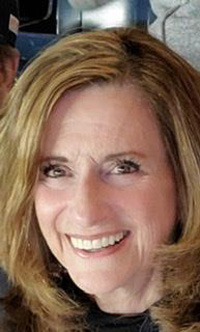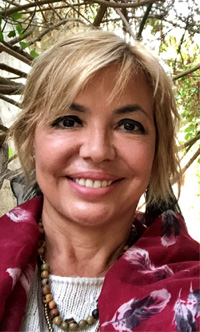Zoom Meeting - April 30
Contact:
Andreas Runggatscher
- Registration for this event is now closed.
|
30 Apr 2020 |
||
 New York New York
|
||
|
ONLINE: Weekly Meeting Apr 30 - Zoom
 Potential Results of COVID-19
Potential Results of COVID-19What lessons have we learned and which intermediate and long-term psychological effects could we expect during and after the pandemic of COVID-19? - And a brief review of the psychopathological consequences of those directly affected by the attacks. Our presenters will be RCNY's Fredlee Kaplan and Dr. Marcela A. Bonafina, Ph.D.
Meeting Agenda
Fredlee Kaplan
As a world community facing this real threat of Covid-19, we all need to draw upon our emotional and social sources of resilience to stand up to it and thrive. Today we will share with everyone our experiences as clinicians and human beings to enable all of us to mobilize these resources. We will talk about:
- Becoming conscious of the here and now real sense of danger with the threat of Covid- 19 and distinguish it from emotional memories in the body of past dangers
- Reducing feelings of isolation and loneliness with connection and contact for those who are alone - how to stay together while apart
- Consciously tolerating and regulating the NORMAL feelings of fear, anger, and anxiety, among others that are arising for all of us with strategies of mindfulness such as breathing, relaxation, and grounding. Self-care with play, humor, music, exercise, nutrition, sleep, and communication are very important.
- Openly communicating and regulating our emotions while in closer than usual living situations can bring opportunities for growth as well as conflict – strategies of being together and alone are skills we all can develop to have the warmth and empathy we all may need at different times at home today.
We will provide a written summary of this presentation with some of the suggestions above for those of you who would like it. Please contact Andreas Runggatscher after the presentation and we will arrange to send it to you.
Dr, Marcela Bonafina
Presentation will be divided in two parts.
The first part will be focused on:
► “Individual, community, and national responses to 9/11: What lessons have we learned and which intermediate and long-term psychological effects could we expect during and after the pandemic of COVID-19.”
► A brief review of the psychopathological consequences of those directly affected by the attacks and the “spillover” effect on the general population.
► Examination of:
• Negative and positive social reactions while living under a constant threat.
• The effects of growing up in the shadow of a national tragedy.
• The role of early interventions to provide a sense of safety, calm, and instilment of hope.
• The process of massive grief and bereavement.
The second part will be focused on:
► “Does the COVID-19 harm the brain?: A brief summary of what do we know so far.”
► Direct and indirect virus injury in the central nervous system.
► Guillain-Barré syndrome.
► Possible risk factors.
The first part will be focused on:
► “Individual, community, and national responses to 9/11: What lessons have we learned and which intermediate and long-term psychological effects could we expect during and after the pandemic of COVID-19.”
► A brief review of the psychopathological consequences of those directly affected by the attacks and the “spillover” effect on the general population.
► Examination of:
• Negative and positive social reactions while living under a constant threat.
• The effects of growing up in the shadow of a national tragedy.
• The role of early interventions to provide a sense of safety, calm, and instilment of hope.
• The process of massive grief and bereavement.
The second part will be focused on:
► “Does the COVID-19 harm the brain?: A brief summary of what do we know so far.”
► Direct and indirect virus injury in the central nervous system.
► Guillain-Barré syndrome.
► Possible risk factors.
About Fredlee Ann Kaplan, LCSW, LMFT
 Fredlee is a Licensed Clinical Social Worker, Licensed Marital and Family Therapist and has been in Private Practice in Manhattan, providing Individual, Couple and Family Therapy since 1976. She graduated from Boston University with a degree in Psychology and earned Master of Arts degrees at Columbia University (Guidance and Psychology) and Rutgers University (Social Work) respectively.
Fredlee is a Licensed Clinical Social Worker, Licensed Marital and Family Therapist and has been in Private Practice in Manhattan, providing Individual, Couple and Family Therapy since 1976. She graduated from Boston University with a degree in Psychology and earned Master of Arts degrees at Columbia University (Guidance and Psychology) and Rutgers University (Social Work) respectively.Fredlee is Vice President and Fundraising Chair of Gift of Life International (GOLI), a global non-profit which is the second largest non-profit humanitarian organization affiliated with Rotary International. It is dedicated to providing heart surgery and establishing sustainable pediatric cardiac surgery centers for children with congenital heart disease living developing countries. She is also the Director of their Humanized Care Programs, which helps hospital medical staffs provide information, compassionate support and stress reduction strategies for children and families to enhance their psychological safety and comfort as they experience the surgery process and their coping strengths as they recover at home and adjust to a second chance at life. In addition, these programs provide strategies for self- care and burnout prevention for nurses, doctors, and other staff who are overburdened in these countries.
She was also Consulting Supervisor for 23 years, training psychiatric residents and psychology interns in Family Therapy in the Department of Psychiatry, Beth Israel Medical Center, NYC, and developed their Multi-Family Group Therapy Program for Schizophrenia. In 2001, she consulted with families who lost relatives in the World Trade Center in New York and with The Families of 9-11 who worked with the Lower Manhattan Development Corporation for the World Trade Center Memorial. She continues to consult to medical centers, hospitals and the mental health community.
About Marcela A. Bonafina, Ph.D.
 Dr. Bonafina obtained her degree in Clinical Psychology from the University of Buenos Aires in 1993. After practicing there for two years, she moved to New York to further her education and pursue a doctoral degree in Psychology with a sub-specialization in Neuropsychology, which I obtained in 2003. As part of her pre-doctoral practicum, she received extensive training in adult neuropsychology including a year-long externship in the area of aging and dementia at the worldwide-recognized Sergievsky Center at Columbia University, and a second year focused on epileptic disorders at the prestigious NYU-Comprehensive Epilepsy Center. Later, she completed her internship in clinical psychology at New York University School of Medicine-Bellevue Hospital in 2001, where she worked directly with trauma and bereavement issues related to the WTC attacks. She also completed two years of post-doctoral experience at New York University School of Medicine-Bellevue Hospital.
Dr. Bonafina obtained her degree in Clinical Psychology from the University of Buenos Aires in 1993. After practicing there for two years, she moved to New York to further her education and pursue a doctoral degree in Psychology with a sub-specialization in Neuropsychology, which I obtained in 2003. As part of her pre-doctoral practicum, she received extensive training in adult neuropsychology including a year-long externship in the area of aging and dementia at the worldwide-recognized Sergievsky Center at Columbia University, and a second year focused on epileptic disorders at the prestigious NYU-Comprehensive Epilepsy Center. Later, she completed her internship in clinical psychology at New York University School of Medicine-Bellevue Hospital in 2001, where she worked directly with trauma and bereavement issues related to the WTC attacks. She also completed two years of post-doctoral experience at New York University School of Medicine-Bellevue Hospital.In research, Dr. Bonafina worked as a Research Assistant at the New York State Psychiatric Institute-Columbia University in different projects within several departments including in the Department of Child Psychiatry and the Department of Biological Psychiatry. Her most recent position has been as a Research Scientist in the Department of Neuroscience at Columbia University, where she participated in the study of the clinical aspects and the neurobiology of suicide among several psychiatric populations including individuals with bipolar disorder, depression, schizophrenia, and borderline personality.
In terms of clinical work, Dr. Bonafina held the position of Assistant Director of the Traumatic Brain Injury Unit at Bellevue Hospital, the official Level 1 Trauma Center of NYC, where she evaluated over 750 traumatic brain injury patients. Later, she was recruited as a Senior Psychologist in the 9/11-WTC Mental Health Program, newly launched by the City of New York at the time, where she assessed and treated trauma victims of the terrorist attacks. As part of her background, she also provided therapy to patients seeking asylum in the Survivors of Torture Program at New York University and completed over 100 forensic evaluations for asylum-seeking immigrants. Throughout the years, she worked as a consultant for the VA New York Manhattan Harbor Health Care System and for some federal agencies (TSA, National Coast Guard, DEA) in different capacities. Currently, she is working in the Department of Defense as a neuropsychologist, a position where she completes regular evaluations to Service Members of the United States Army, particularly assessing soldiers with traumatic brain injury, depression, anxiety, and PTSD. Dr. Bonafina is routinely hired as an expert witness to consult and evaluate different types of forensic cases.
In terms of teaching, since very early in her career, Dr. Bonafina held several academic positions in distinguished institutions such as the University of Buenos Aires, Columbia University, and New York University, where I have worked as a Clinical Assistant Professor in the Department of Psychiatry, therefore having the opportunity to supervise externs as well as interns and post-doctoral students. Passionate of her work, she has also volunteered as executive officer in scientific societies, advisory boards, task-force groups, and steering committees.

